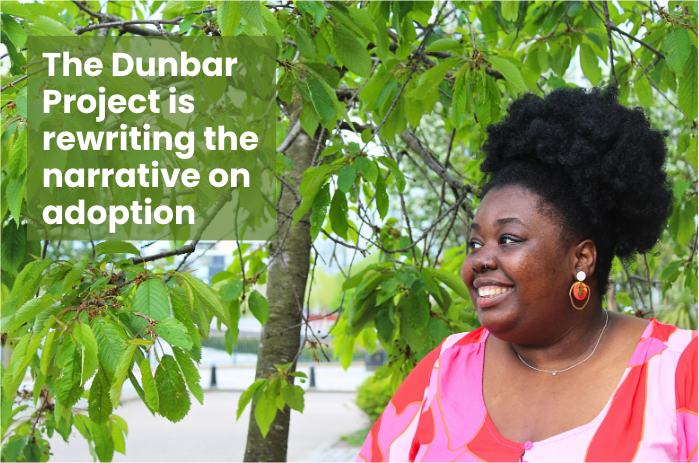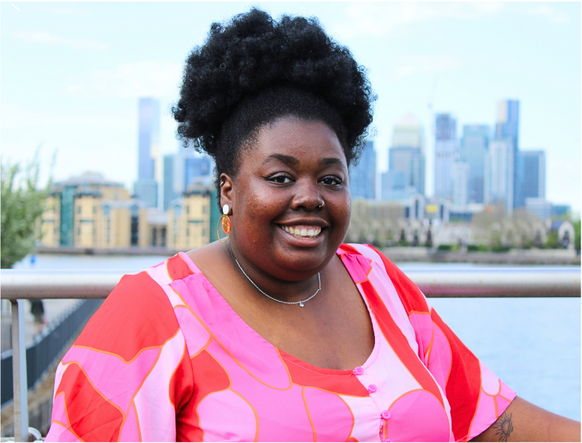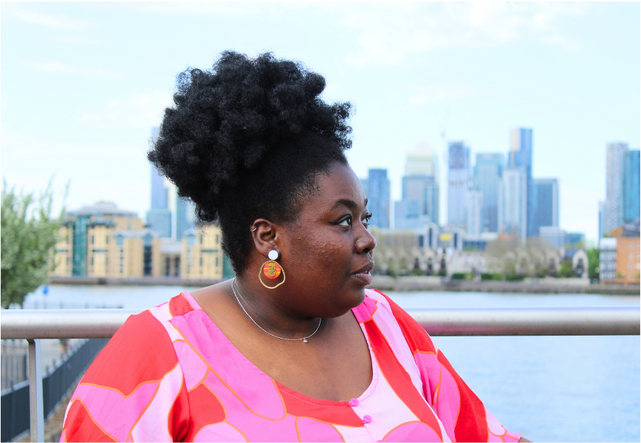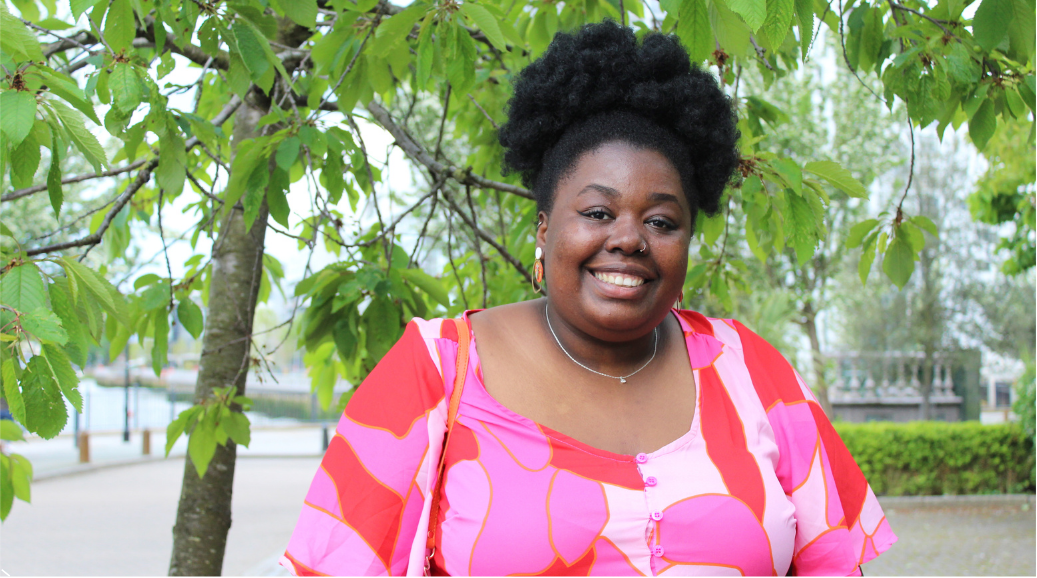Shania-Sophia Dunbar Ives, the Founder, CEO and Director of Operations at The Dunbar Project, spoke to The Blagrave Trust about the urgent need to reframe narratives around adoption and how we can help adoptees to heal.
*Since this story was written, Adoptee Futures CIC has rebranded to The Dunbar Project. You can read more about this in a statement by Shania.*
For many young people in the UK and beyond, the protracted periods of lockdown mandated in response to the Covid-19 pandemic brought their traumas to the surface. Lots of people turned to the internet in search of mental health support and community. Among them was Shania, who founded Adoptee Futures CIC, now The Dunbar Project. While accessing an online adoptee space on the social audio app Clubhouse, she observed just how acute the mental health crisis is amongst adoptees; a crisis made worse by a lack of understanding from the organisations that are meant to support adoptees and society more broadly.
Shania and her team, at the time, who met online during the pandemic, put their heads together and developed a strategy for providing a new kind of support to adoptees, informed by their lived experiences and grounded in a more nuanced understanding about adoption and its implications.
“Adoption is trauma and adoption involves multiple traumas.”
“I wanted to reclaim the adoption narrative,” says Shania. “It was really frustrating that adoption is the only trauma in which the people who have gone through the trauma aren’t the main voice speaking about it. Reclaiming the narrative and reframing the world’s view on adoption led us to a lot of opportunities around education. The reason people don’t understand things is because they haven’t learned, and without learning things they can’t understand. I wanted to teach people about why adoption happens, and what the things are behind adoption that mean, for example, that Black children are overrepresented in the care system.”
At the time, Shania, an adoptee herself, was studying Clinical Psychology at university and was researching the lifelong impacts of adoption and the developmental and childhood trauma it causes. Healing from adoption became a central part of her mission early in the development of her work.
“I am very big on acknowledging that adoption is a massive trauma and it’s very difficult but it’s important to not stay within that and to find ways to cope with it, to not just survive but thrive. The team came up with our tagline: reclaim, reframe, heal, and we looked at those three things and thought, ‘how can we put this into action?’”
Shania began testing her approach by focusing on events. She was invited to organise a panel discussion for the Festival of Debate, at which an adoptive parent, a birth parent, and several social workers and adoptees spoke about the realities and myths of adoption. The event was a huge success, and she was inundated with supportive emails from people, validating the urgent need for similar events and opportunities.
“Adoption comes up all the time,” says Shania. “I was at safeguarding training the other day for work and the story that came up was very similar to the story of how I was born so I think, in the day to day, we don’t think about how people can be affected and how they can be triggered. The answer to a lot of that is education.
How do we educate adoptive parents to help their children heal as much as they can? How can we educate other adoptees to not gaslight themselves, to be more at peace with themselves and understand that what they’re going through isn’t their fault? Can we educate them to understand how to feel better? Also educating professionals to work with a more trauma-informed perspective because a lot of the ways of working amongst social workers are very dated. How can we educate schools and workplaces to account for the trauma of adoption?”
To this end, Shania organised her first programme of priced workshops for adoptive parents, people thinking about adopting or who were in the process, and people who had already adopted. At the three workshops, adoptees led discussions about the difficulties that children encounter, how to best parent an adopted child and more.
“When people think of adoption they think of a child and they don’t think about that child growing up.”
Shania turned her attention towards developing a programme of support exclusively for adoptees and, having incorporated a CIC, successfully secured funding from The National Lottery Community Fund, with which the CIC hosted its inaugural Summer of Healing, a series of six workshops run by adoptees, including adoptee yoga instructors, therapists and musicians.
“As people with lived experience and as a Black woman and younger we really have to fight to be taken seriously. Adoptees are infantilized because when people think of adoption they think of a child and they don’t think about that child growing up. So I was like, right, I want to make a business out of this. I know we’ve got a good idea and I know that it’s needed.”
A year later, Shania made a successful application for support from the Challenge and Change Fund.
“I feel like Blagrave takes us seriously,” says Shania. “As a young person, it’s been difficult at times when people don’t take you seriously because you’re not well established, but I feel like Blagrave really sees -I’m quoting Whitney Houston- that children are the future. We need to learn from people with lived experience because we’re the ones who’ve been through it. It really felt like Blagrave didn’t treat us like children. It felt like from the start to now, they understood that we know what we’re talking about. It felt very supportive and like they’re proud of us and that we are trusted.”
“It’s so beautiful to see people come along who have never spoken about adoption in their life.”
With funding from Challenge and Change, The Dunbar Project has created a monthly programme of healing and talking workshops for adoptees with various and intersecting identities. The design of this programme was greatly informed by Shania’s degree, during which she conducted a qualitative study on the mental health of Black adoptees who face racism, generational traumas and developmental traumas. Several of the people she interviewed in the process spoke about being a ‘multiple minority’.
“So me, for example, I’m Black so I’m part of the Black community,” explains Shania. “I’m queer so I’m also part of the queer community, and I’m adopted so I’m part of the adoptee community. There are so many studies out there that show community can be such a protective and healing factor, which is so true. However, when you’re a multiple minority, I can be in the Black community and face homophobia, so that’s not a safe space, or I can be in the adoptee community and I can face racism. With the funding, we’ve created three groups for adoptees: one for all adoptees, one for Black adoptees and one for queer adoptees. We want to do more because there are disabled adoptees and other ethnic minorities but neither of us have a disability or are from other backgrounds so we thought we should stick with what we know we can provide for now.”
During the talking workshops, the groups discuss topics including what it’s like to be a Black adoptee or parenting as an LGBTQ+ adoptee from an abolitionist lens. On this latter topic, Shania is keen for people to understand The Dunbar Project’s position, which is shared by many adoptees and their allies.
“We come from a family preservation perspective so we believe that if you can keep a child with their mother, that should be what happens first. There will always be children who will need a home and aren’t able to live with their families so there are a lot of conversations going on at the moment about what the alternatives are. I’m not sure that adoption will ever be abolished but it’s just really having nuanced thinking about what could replace it and what could cause less trauma.”
Shania is planning to expand the Project’s summer offering by delivering Healing Through Enjoyment sessions, during which participants can play games and create art together. The network has grown to around 700 people, and the Project connects with adoptees primarily through social media and a mailing list. They are currently building a moderated chat room exclusively for adoptees.
“It’s so beautiful to see people come along who have never spoken about adoption in their life or not had a space to speak about how they feel about certain things, and express themselves, feel safe, feel free to share their story. Lots of them go away and implement things in their day to day life. They feel seen. They feel like they have a place to go. I think that it’s made people feel a lot less alone and it’s helped people to explore the nuances of their own adoptions, learn from other people, encourage other people and become creative.”
Despite the overwhelming support they have received from adoptees, the Project has faced substantial backlash from adoptive parents.
“I think with a lot of them, they go through their own trauma with infertility and things like that,” explains Shania. “So sometimes they want their child to be how they want them to be. They want this perfect vision of adoption that is wonderful. When you have people coming together and saying, actually, no, this or that negative thing might happen, people don’t really know how to handle it. People think you’re ungrateful.
There’s been a difference between how I, as a Black woman, have been handled compared to some of my white counterparts. It feels like we have to work so much harder to even be received, and we receive a lot of questions when we ask for donations about what the donations are for, which is a valid question but it seems like we’re treated differently. Also, in terms of the infantilization of adoptees, people have expected us to work for free and then, when we decline, they’re quite annoyed.”
“If us adoptees step up, then the next generation won’t be facing the same problems.”
As a researcher, Shania is planning to produce more vital information about the realities of adoption with which to influence government policy and third sector practice. Shania believes that the Project is uniquely positioned to lead this work; informed, as it is, by the lived experiences of a substantial network of adoptees.
“I am building a safer world. A world where adoptees can understand themselves,” she says. “As an adoptee, you’re brought up feeling like ‘I should feel lucky’ but then you end up exhibiting behaviours that are because of your trauma. The Project aims to create a world where adoptees can be released from self doubt and navigate the different stages of their lives more peacefully, whether that’s when they’re going through menopause or having children and being triggered by hospital birth settings, or when they’re having blood tests and are asked if they have a history of diabetes in their family, or when they’re in work.
If us adoptees step up, then the next generation won’t be facing the same problems. I’ve been brought up to fight for what I believe in. I was given a very safe space as a young person to express my feelings, whether they were right or wrong. My parents always let me express myself so I didn’t think twice about expressing myself to the public. I didn’t think about any backlash we would get. We just thought that if we could do something, even if it was small, and it makes a change to even just one person, then it’s worth it.”
—
You can connect with The Dunbar Project on their website, where you can also join their adoptees healing communities. You can also donate to the Project here.
—
The Challenge and Change Fund is designed by young changemakers for young changemakers. It funds young people directly, supporting them to create the change they want to see. It prioritises young people who are emergent and have lived experience of the injustices they are trying to change, supporting youth led collectives, social enterprises and CICs across England. You can read more about Challenge and Change here.



